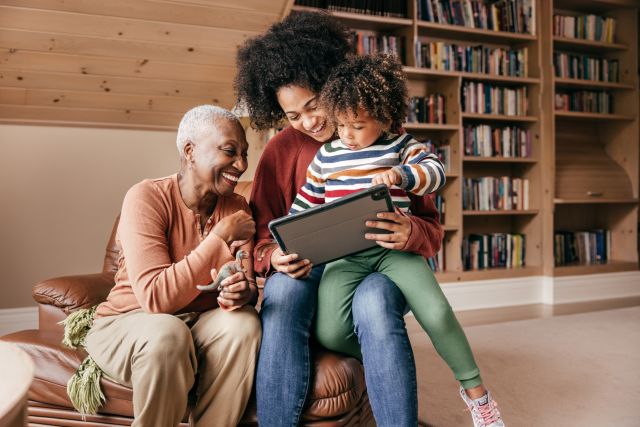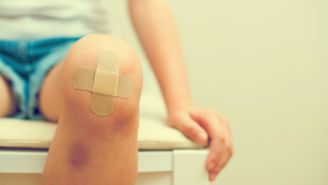Updated on August 27, 2024.
If you care for grandchildren full time, part time, or even for an occasional extended visit, you know it takes preparation. That means stocking the refrigerator with their favorite (nutritious) foods, loading up on books and toys, and making up bedrooms for peaceful sleep.
But there’s something even more important you need to do: Make sure you have the most up-to-date information about keeping them safe and sound.
First aid, fever treatment, and medication
Sometimes, grandparents follow outdated health and safety practices. For example, in a 2020 study published in GrandFamilies: The Contemporary Journal of Research, Practice and Policy, researchers polled 733 grandparents who identified as the primary caregiver of one or more grandchildren. They found that a large percentage were using old guidelines for first aid and fever treatment.
For example, 64 percent of respondents believed that scrapes would heal better without a bandage. And when treating a fever, almost 40 percent thought an ice bath was the appropriate method.
In fact, the best method for treating minor scrapes and burns is to clean the wound with soap and water, apply antibacterial ointment, and cover with dry gauze or a bandage until it heals. That’s according to the American Academy of Pediatrics (AAP).
The best treatment for fever? If it's mild and the child is eating and drinking normally, sleeping well, and is still able to play, no treatment is necessary. If the fever is making the child uncomfortable or is accompanied by aches and pains, treatment may consist of consuming fluids and wearing light clothes in a comfortable, cool room. They may be able to take ibuprofen or acetaminophen with the guidance of healthcare provider (HCP), as well.
Never give aspirin to children and never use a cool bath or rubbing alcohol to treat fever, as these could cause serious side effects. And whether for fever or other illnesses, avoid giving children medicine that is packaged for adults unless an HCP recommends it. That goes for cough and cold products in particular: Children under 6 years of age should not take them, according to the Centers for Disease Control and Prevention (CDC).
Safe sleep practices
When it comes to putting children to bed—particularly toddlers and infants—it’s essential to know and follow the advice of leading medical organizations. But not all caregivers are aware of the latest best practices.
A 2017 study done by Northwell Health assessed the health beliefs of 636 grandparents. Almost one-quarter didn’t know that placing infants on their back in the crib reduced the risk of sudden infant death syndrome (SIDS).
Grandparents, and all caregivers, should follow safe sleep practices for infants, as recommended by the AAP. Infants should be placed on their backs in a crib or bassinet with a firm, flat mattress that's covered with a fitted sheet. The sleeping environment should be smoke-free with no other people or objects with them. Avoid setting an infant to sleep on a couch or chair, swing, or car seat. Do not allow pillows, stuffed animals, loose blankets, or bumpers in the sleep area.
The stakes are high when it comes to proper sleep practices: According to the AAP, improper sleep setups claim the lives of 3,500 infants every year.
Car seat guidelines
Grandparents who enjoy taking their grandchildren on outings should also stay up to date on the latest car seat regulations. This is critical, as car crashes are a leading cause of death in children in the United States, according to the CDC.
Follow these guidelines:
- Infants and toddlers should be in a rear-facing car seat until the ages of 2 to 4, or until they hit the maximum height or weight limit of their particular car seat. It should always be placed in the back seat of the car, and never in the front.
- Once kids outgrow a rear-facing seat, they can move to a forward-facing car seat. It should be placed in the back seat of the car with a harness and top tether. Forward-facing car seats can accommodate children weighing up to 65 pounds, sometimes more. Review the manufacturer’s label for specifics.
- Belt-positioning booster seats may be used in the back seat when a child reaches or exceeds forward-facing car seat weight or height limits.
- At around 4 feet, 9 inches in height and approximately 8 to 12 years old, car seats and boosters are no longer needed.
It's extremely important to remember that children 12 years and under should always ride in the back seat of a vehicle. While front passenger air bags can be lifesaving for adults, they may injure or even kill young children when they deploy in a crash.
There's good reason to follow these tips: According to the CDC, the use of car seats reduces the risk of injury in crashes by up to 82 percent for children, compared to the use of seat belts alone. Booster seats reduce the risk of serious injury by up to 45 percent for kids ages 4 to 8, compared with seat belts alone. And for older children (and adults), seat belt use reduces the risk for death and serious injury by roughly half. Model good behavior for young ones by always wearing a seat belt when driving.
With a little research into the latest guidelines—and possibly a few smart purchases—you can help ensure the health and safety of your grandkids while making lasting memories.







